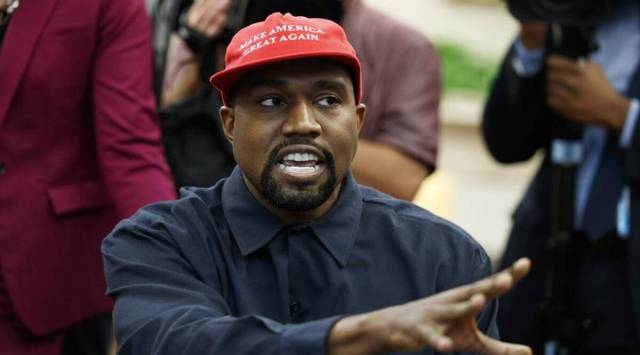
This Twitter thread is accruing more nuance than its original tweeter ever intended. Multi-millionaire rapper-songwriter, Ye (formerly known as Kanye West), who has always had an uncanny ability to dodge personal brand fiascos despite a consistently controversial public presence, may finally be seeing his bankable name go up in dollar-shaped flames. Early October, at a fashion show in Paris, Ye walked the ramp with conservative political pundit Candace Owens, both wearing t-shirts that said “White Lives Matter”. The response was swift — rapper Diddy condemned the move, earning Ye’s expletives; Vogue editor Gabriella Karefa-Johnson called it “hugely irresponsible”, with Ye responding by posting her images on Instagram and mocking her. The cherry on top? A late-night tweet that said, “I’m a bit sleepy tonight but when I wake up I’m going death con 3 on JEWISH PEOPLE.”
He probably meant DEFCON 3 (a United States army defence alert). But don’t be alarmed. Owens says it’s a “defence alert, not an offence alert”, so the tweet shouldn’t offend anyone. Phew.
The aftermath has been alternately tragic and hilarious. Ye’s billionaire status was demoted to multi-millionaire after several corporate partnerships boycotted him, including fashion house Balenciaga, Gap and Adidas. His Instagram and Twitter accounts were restricted (“The Jewish media blocked me out!”). Investment bank JPMorgan Chase told him his business was no longer welcome. Several criticised his (undeniably) anti-semitic tweet. Others, however, defended it, and it wasn’t just his celebrity buddies — many fans followed a familiar script, saying that his 2016 diagnosis of bipolar disorder means he isn’t always in control of his words and should be excused for them.
Sorry, no.
Giving Ye a free ride for his comments is to imply bigotry is a natural byproduct of a mental illness. Yes, according to the American Psychological Association, bipolar disorder makes one prone to, “extremes of happiness, energy, and clarity to sadness, fatigue, and confusion”. But many in the world suffer from the ailment and do so without racist outbursts. One can be empathetic to a person with a mental disorder without excusing their harmful actions, not least when the person in question has the influence and reach of Ye. And there are positions of power with far more stature than a pop culture icon.
A year after Donald Trump became US president in 2016, speculation began about his mental fitness to lead the country. It reached such a pitch that Trump agreed to a psychiatric evaluation in 2018, in which he was found to not have dementia. But mental health experts were absent from the conversation that had been led largely by unqualified journalists and pundits. Why? Because a 1964 ethical guideline prohibited psychiatrists from making any public assessments about public figures they haven’t personally examined. Dr Bandy Lee, a forensic psychiatrist who edited The Dangerous Case of Donald Trump (2017), a collection of 27 essays by mental health experts assessing Trump’s public behaviours, reportedly said such a “gag rule” is “alarming” apropos a country’s president. She added that journalists would downplay Trump’s behaviours as deviations from the normal if they are not allowed to speak to experts who can flag psychological signs that are a danger to national and international security. “We’re not interested in making a diagnosis,” she said, “A diagnosis has nothing to do with [signs of danger].”
Political office and the arts are, of course, not the only arenas where discussion around mental illness needs more nuance. Tech moguls like Elon Musk and Jeff Bezos affect large swaths of our media landscape. The former has peddled coronavirus misinformation, gamed the stock market, and opposed unionisation. The latter has the resources to fly to space but not to let his employees have regular toilet breaks. Critics often attach terms like “narcissistic”, “sociopathic” and “psychopathic” to these men’s names while lambasting their exploitative labour practices. But these terms are not neutral adjectives — they signify psychiatric disorders that need to be diagnosed or assessed by professionals. For unqualified journalists and the general public to make such claims when they can stick to attacking such billionaires’ sufficiently troubling business practices cheapens the mental health conversation for all who suffer from mental illnesses — most of whom will never have the resources to combat the stigmatisation resulting from a Ye fan who says death threats to Jewish people are only a side-effect of bipolar disorder.
udbhav.seth@expressindia.com